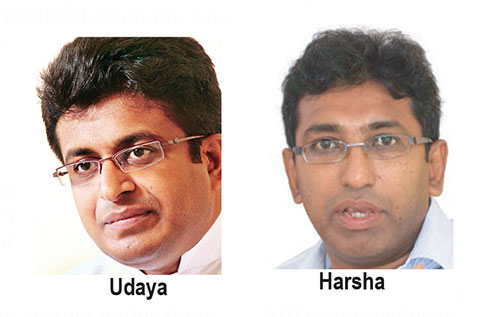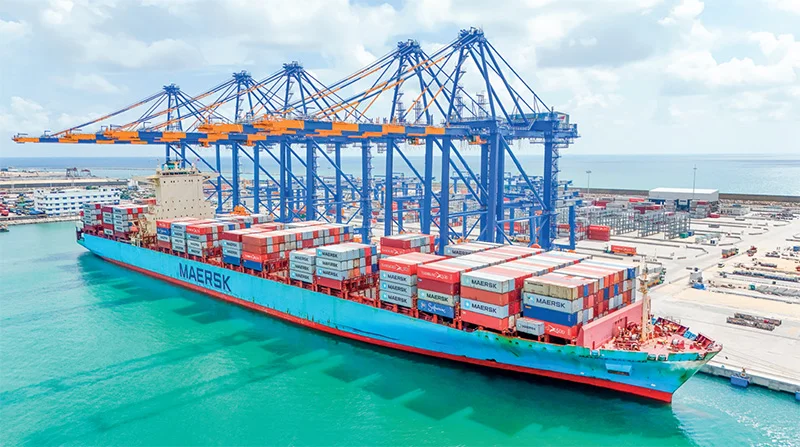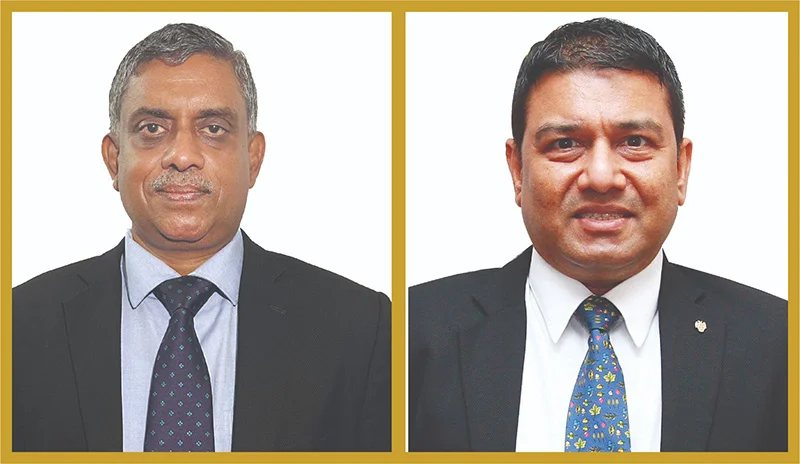News
Crisis cannot be tackled by fuel price increases alone: SJB prescribes IMF

By Shamindra Ferdinando
Samagi Jana Balavegaya (SJB) spokesperson Dr. Harsha de Silva, MP, yesterday (21) called for immediate remedial measures in the wake of Energy Minister Udaya Gammanpila’s shocking admission that the national economy was in such a bad shape it found it difficult to pay for oil imports.
Former UNP non-Cabinet minister de Silva said that there had not been a previous instance of a minister expressing fears of collapse of the banking system under their watch unless corrective measures were taken. The Colombo District MP recommended the government to seriously consider seeking IMF’s assistance before the situation further deteriorated .
Noting that both the Energy Minister and the Presidential Secretariat declared that state banks could be overwhelmed by staggering Rs 737 bn loans owed by the Ceylon Petroleum Corporation (CPC) and Ceylon Electricity Board (CEB), MP de Silva emphasised that the monetary crisis could not be addressed by increasing fuel prices alone.
COPE member MP de Silva appreciated Attorney-at-law Gammanpila for being frank in his assessment. The SJB MP explained ways and means of addressing the issues at hand when The Island asked whether the Parliament as an institution should adopt a common stand on national economy and take tangible remedial measures?
The Island also sought the MP’s suggestions on stabilising the economy.
Economist de Silva said that Minister Gammanpila is on record as having said that the Central Bank in a letter dated May 31, 2021 warned the Finance Ministry of dire consequences unless remedial measures were taken.
MP de Silva said that State Minister of Finance, Capital Markets and State Enterprise Reforms Ajith Nivard Cabraal in a recent interview with Irida Lankadeepa confirmed Minister Gammanpila’s statement. However, it would be a grave mistake on the part of the government to believe such an extremely serious situation could be tackled by increasing fuel prices.
The former Policy Planning Deputy Minister said the issue at hand is so serious, it could not be fixed by just increasing fuel prices. “A macro prudential analysis must be undertaken by the Central Bank without further delay. The systemic risks must be identified and assessed. The vulnerability of the banking system must be immediately addressed beyond the mere inability of the CPC to make good on their payments,” MP de Silva said.
MP de Silva underscored the desperate situation the state banks were experiencing. The MP said that state banks were entering into dollar swaps at massive discounts. For instance, buying dollars today at Rs 199.99 with settlement in a year at Rs 181.99. “Consider the risk these state banks are running. Can they get dollars at Rs 181.99 in a year’s time or will the dollar cost Rs 210 or even higher? Whose money is at risk? Another glaring example is the plan to borrow USD 1 billion from ‘unsolicited’ bidders. This is unbelievable. Are we going to integrate our banking system with money laundering operators to allow them to clean black money? What will happen to our credibility in the longer run? These are all serious matters that need immediate attention.”
Responding to another query, MP de Silva asserted that the best option available to the SLPP government was to restructure the country’s debt. “If we, do it now, we should be able to come out of the crisis with only a re-profiling exercise, meaning a delay in our payments to the bond holders instead of asking them to take a haircut, meaning to agree to a reduction in principle,” he said.
The SJB heavyweight asked would working with the IMF acceptable than seeking deals with those hoping to clean their dirty money. The current crisis should be tackled by working with the IMF whatever the political agenda the SLPP hoped to pursue, the government had no option but to seek IMF assistance or face a catastrophe. MP de Silva said that he suggested six months ago that Sri Lanka had no option but to undertake a restructuring process with the IMF. Although the government had ignored warnings and declared it would never go to the IMF, the crisis triggered by the fuel price hike exposed the government. “Unfortunately for the people of Sri Lanka the more these people continue this delay in restructuring the greater the pain will be when it finally is thrust upon us. We need a soft landing. Not a hard landing,” Dr. de Silva said.
The former minister said that this would be raised in parliament. Referring to a media briefing called by Minister Gammanpila early this month whereas announced plans for a new oil refinery at Sapugaskanda, MP de Silva said that the PHU leader said that cash-strapped debt-ridden government lacked the wherewithal to make an investment therefore needed external financing amounting to USD 3 bn. The former Minister said that Minister Bandula Gunawardena and State Minister Dr. Nalaka Godahewa, too, acknowledged the severe financial difficulties with the latter explaining how the raging Covid-19 pandemic worsened the situation.
News
Breakaway JVP faction decries Indo-Lanka MoUs as betrayal

… alleges Kanchana’s Electricity Act exploited to facilitate ‘deal’ with India
The Frontline Socialist Party (FSP) has alleged that President Anura Kumara Dissanayake entered into seven MoUs/Agreements with India without consulting Parliament or the Cabinet of Ministers.
Accusing President Anura Kumara Dissanayake, who is the leader of the Janatha Vimukthi Peramuna (JVP), as well as the National People’s Power (NPP), of undermining Sri Lanka’s sovereignty, the breakaway JVP faction pointed out the signing of seven MoUs/Agreements had coincided with the 54th anniversary of the JVP’s first insurrection.
The top FSP spokesman and their Education Secretary, Pubudu Jayagoda, told a press conference, at their Nugegoda party office, that the JVP had completely betrayed those who sacrificed their lives during the 1971 and 1987-1990 insurrections. Having completely changed its policy towards India, the JVP was now down on its knees before India, Jayagoda said.
The dissident JVPer emphasised that such vital MoUs/Agreements couldn’t be finalised without proper consultations. Declaring that the MoUs/Agreements hadn’t been released yet, Jayagoda said that the FSP, in terms of the Right to Information Act, sought the copies of them as the public couldn’t be deprived of their right to know.
The section, now calling themselves FSP, split from the JVP in early 2012 after major differences among the top leadership over the direction of the party. Anura Kumara Dissanayake succeeded Somawansa Amarasinghe as the JVP leader in Dec. 2014.
Referring to the MoU, in respect of the implementation of HVDC interconnection for import/export of power, Jayagoda said that the NPP took advantage of the new Electricity Act that was enforced by the Wickremesinghe-Rajapaksa government in late June last year to pave the way for a deal with India. The JVP-led NPP that moved court against the then Power Minister Kanchana Wijesekera’s Bill, and voted against the Bill at the second reading, exploited the same to its advantage, Jayagoda charged.
The Sri Lanka Electricity Bill repealed the 1969 Ceylon Electricity Board (CEB) Act and subsequent laws regarding the electricity industry.
Comparing the MoU, signed in the presence of President Dissanayake and Premier Narendra Modi, Jayagoda said that both Nepal and Bangladesh had been trapped in similar agreements they signed earlier.
Jayagoda alleged that Nepal was in such a pathetic situation even if they could meet electricity requirement through hydro-power generation, the agreement with India compelled them to obtain power from India.
Jayagoda pointed out that the government now boasted of a proposed new120 MW solar power plant at Sampur to be implemented in two stages after having crippled domestic solar power generation capacity. The former JVPer said that the NPP government was bending backwards to appease India and pursuing an agenda inimical to Sri Lanka.
Jayagoda dealt with the MoU on cooperation in the field of sharing successful digital solutions implemented at population scale for digital transformation. The FSP spokesman said that the Indian-funded project to issue digital NIC would be disastrous as it would enable India to gather information.
Commenting on a MoU that covered the health sector, Jayagoda alleged that the government had agreed to share authority exercised by the National Medicine Regulatory Authority (NMRA) with India.
Jayagoda said that the MoU on defence cooperation undermined the country’s vital security interests and jeopardised relations with other countries.
The FSP said that political parties, represented in Parliament, were largely silent and seemed to be reluctant at least to express their views on the betrayal of the country.
By Shamindra Ferdinando
News
Adani’s Colombo Terminal commences operations

Adani Ports and Special Economic Zone Ltd. (APSEZ), India’s largest integrated transport utility, has announced the commencement of operations at the Colombo West International Terminal (CWIT), located at the Port of Colombo, the company said in a statement issued simultaneously in Ahmedabad and Colombo yesterday (07)
Developed under a landmark public–private partnership, CWIT is operated by a consortium comprising India’s largest port operator Adani Ports & SEZ Ltd., leading Sri Lankan conglomerate John Keells Holdings PLC, and the Sri Lanka Ports Authority, under a 35-year Build, Operate, and Transfer (BOT) agreement.
The CWIT project represents a significant investment of USD 800 million and features a 1,400-metre long quay and 20-metre depth, enabling the terminal to handle approximately 3.2 million Twenty-foot Equivalent Units (TEUs) annually. It is the first deep-water terminal in Colombo to be fully automated, designed to enhance cargo handling capabilities, improve vessel turnaround times and elevate the port’s status as a key transshipment hub in South Asia.
Construction began in early 2022 and has since achieved rapid progress. With the installation of cutting-edge infrastructure now nearing completion, CWIT is poised to set new benchmarks in operational efficiency and reliability in regional maritime logistics.
“The commencement of operations at CWIT marks a momentous milestone in regional cooperation between India and Sri Lanka,” said Chairman of the Adani Group Gautam Adani. “Not only does this terminal represent the future of trade in the Indian Ocean but its opening is also a proud moment for Sri Lanka, placing it firmly on the global maritime map. The CWIT project will create thousands of direct and indirect jobs locally and unlock immense economic value for the island nation. It also stands as a shining example of the deep-rooted friendship and growing strategic ties between the two neighbours, and of what can be achieved through visionary public–private partnerships. Delivering this world-class facility in record time also reflects the Adani Group’s proven ability to efficiently execute large-scale critical infrastructure projects anywhere in the world.”
“We are proud to see the progress in the development of the West Container Terminal, a project that strengthens Sri Lanka’s position as a regional maritime hub,” said Chairperson, John Keells Group Krishan Balendra. “This project is one of the John Keells Group’s largest investments and is among the most significant private-sector investments in Sri Lanka. Together with the Sri Lanka Ports Authority and the Adani Group, we will elevate Colombo’s status as a leading transshipment hub. We are confident that the project will enhance global trade and connectivity in the region”, he said.
News
SLIC Life reports robust performance with Rs. 30.7 Billion PBT in 2024

Sri Lanka Insurance Corporation Life Limited (SLICLL) has concluded the year 2024 with outstanding financial performance, achieving a remarkable profit before taxation of Rs. 30.7 billion. The text of SLIC statement: “The company recorded a robust Gross Written Premium (GWP) of Rs. 26.3 billion, reflecting an impressive 25% growth. Remarkably, as of December 31, 2024, Sri Lanka Insurance Life marked a historic milestone with a New Business volume of Rs. 5.3 billion, recording a 48% growth, the highest in the company’s history.
Demonstrating its unwavering commitment to policyholders, Sri Lanka Insurance Life disbursed Rs. 13.7 billion in maturity settlements and claim payments in 2024, these figures reaffirm the company’s financial strength and dedication to fulfilling its obligations. Further cementing its position as a market leader, SLICLL continued to expand its asset base to an impressive Rs. 237 billion and grew its Life Fund to Rs. 213.2 billion. These achievements were realised amidst organizational transformations and challenging economic conditions. Additionally, the company recorded 319 MDRT qualifiers, the highest ever for SLIC Life.
Highlighting its prudent investment strategies and unwavering commitment to policyholders, Sri Lanka Insurance Life declared the largest Life Insurance bonus in the industry for 2023, amounting to Rs. 11.2 billion. Over the past two decades, the company has consistently delivered industry-leading bonus payouts, with cumulative declarations exceeding Rs. 104 billion. Continuing this legacy, Sri Lanka Insurance Life is set to declare its highest ever bonus for 2024, with official communication to be released in the near future.
Group Chief Executive Officer of Sri Lanka Insurance, Mr. Chandana L. Aluthgama, stated, “Our exceptional financial performance is a testament to the dedication and resilience of our team, who have navigated challenges with unwavering commitment. Despite economic fluctuations and internal transformations, our strategic focus has reinforced our market leadership. As we step into the future, we remain committed to innovation, customer trust, and industry leadership.”
Chairman of Sri Lanka Insurance, Mr. Nusith Kumaratunga, emphasized, “Sri Lanka Insurance Life has proven its strength and stability, delivering sustainable growth while reinforcing its role in the nation’s economic progress. Our vision extends beyond business success, we aim to contribute to national development by strengthening the economy and reducing dependency of the people on state support.”
Beyond financial success, Sri Lanka Insurance Life continued to earn industry recognition in 2024. The company was named ‘The Most Loved Life Insurance Brand’ by LMD for the seventh consecutive year and was ranked among the ‘Top 100 Most Valuable Brands’ in Sri Lanka by LMD Brand Finance. Additionally, SLIC Life secured top honors at the ‘Best Management Practices Company Awards 2024,’ ranking among the top ten companies and winning the ‘Insurance – Public Sector Company’ category.
Committed to international standards and operational excellence, Sri Lanka Insurance Life maintains ISO 9001:2015, ISO/IEC 27001:2013, and ISO 14064-1:2018 certifications. The company also continues its social impact initiatives, including the free Life Insurance cover gifted to parents of newborns on World Children’s Day for the third consecutive year, supported 1100 families in flood affected areas, providing emergency assistance to pilgrims traveling to Anuradhapura for Poson Poya and the awarding of 370 Suba Pathum scholarships to outstanding students in national examinations.
Looking ahead, Sri Lanka Insurance Life remains focused on driving innovation, enhancing customer confidence, and making meaningful contributions to society. With a solid foundation and a clear vision, the company is poised to maintain its legacy of excellence and leadership in the insurance industry.
.
-

 Business1 day ago
Business1 day agoColombo Coffee wins coveted management awards
-

 Features2 days ago
Features2 days agoStarlink in the Global South
-

 Business3 days ago
Business3 days agoDaraz Sri Lanka ushers in the New Year with 4.4 Avurudu Wasi Pro Max – Sri Lanka’s biggest online Avurudu sale
-

 Business4 days ago
Business4 days agoStrengthening SDG integration into provincial planning and development process
-

 Business3 days ago
Business3 days agoNew SL Sovereign Bonds win foreign investor confidence
-

 Sports5 days ago
Sports5 days agoTo play or not to play is Richmond’s decision
-

 Features2 days ago
Features2 days agoModi’s Sri Lanka Sojourn
-

 Sports4 days ago
Sports4 days agoNew Zealand under 85kg rugby team set for historic tour of Sri Lanka











